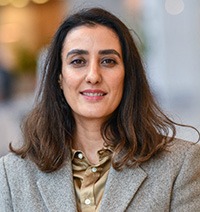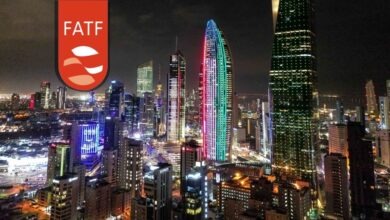Building the Future: Kuwait’s Resilient Path to Vision 2035
This op-ed, titled ‘Building the Future: Kuwait’s Resilient Path to Vision 2035,’ examines how Kuwait can remain committed to its long-term national development goals amid current regional crises, climate pressures, and economic challenges. It highlights the importance of national preparedness and emphasizes the critical roles played by youth, women, civil society, and the private sector in building a resilient and future-ready Kuwait. The article offers actionable recommendations for policymakers, the business community, and citizens, encouraging collective action and cross-sectoral collaboration to stay the course on Vision 2035.


By Sarah Al Sabah
Special to The Times Kuwait
Our region faces a confluence of challenges that feel both heavy and defining, from geopolitical tensions to a deepening climate emergency and the ever-evolving technological advancements. These pressures impact us in real-time. Just this May, an unprecedented early heatwave sent temperatures soaring to 48°C, pushing Kuwait’s power grid to its limits and forcing emergency outages. Such climate extremes underscore how vital national preparedness has become. Yet Kuwait has weathered storms before, both literal and figurative, and emerged stronger. Today, the call is to stay the course on our Vision 2035 transformation, using resilience and innovation to turn turbulence into opportunity.
Vision 2035, also known as New Kuwait, is our blueprint for a thriving future. It aspires to transform Kuwait into a diversified, sustainable economy and a regional financial and commercial hub led by a dynamic private sector. Crucially, this vision is not just about buildings and budgets; it is about people and purpose. National resilience in uncertain times means investing in our human capital, strengthening social cohesion, and thinking decades ahead. In a time of regional uncertainty, climate pressure, and rapid technological change, staying the course on long-term reforms and innovation is more important than ever. To do so, Kuwait must harness the full strength of its society. Kuwait must harness its youth and women, civil society and the private sector to remain future-ready and unshakeable in the face of disruption.
Preparedness Amid Regional and Climate Challenges: In an era of shifting regional alliances and global disruptions, Kuwait’s security and prosperity depend on proactive preparedness. The Middle East’s volatility, whether conflicts flaring beyond our borders or economic shifts as the world pivots away from oil, tests our stability. Meanwhile, climate change is no longer a distant threat but a present reality: extreme heat waves, rising sea levels, and the strain on water and energy resources are already being felt. Kuwait is one of the hottest countries on earth, with summer temperatures exceeding 52°C in recent years. These trends pose direct risks to public health, infrastructure, and the economy, underscoring why building resilience is not optional, but imperative.
National preparedness means planning ahead for such shocks. Take the power grid crisis this year, decades high electricity loads prompted Kuwait to import emergency power from GCC neighbors and fast track new solar and power projects. It was a wake-up call that climate pressures demand urgent innovation. In line with Vision 2035’s pillar of a ‘Sustainable living environment’, Kuwait is accelerating investments in renewable energy and climate adaptation. The country aims to generate 15 percent of its energy from renewable sources by 2035, with major solar and wind projects like the Shagaya Renewable Energy Park already underway. Shifting to clean energy will not only reduce carbon emissions but also improve energy security and reliability in the face of extreme weather. Likewise, sustainable infrastructure, from green buildings to better water management, is being prioritized so our cities remain livable under harsher climates.
Regional uncertainties also remind us why self-reliance and strategic foresight are key. Kuwait’s Vision 2035 was conceived during a time of global and local upheaval as a clear, ambitious plan to bolster our national resilience. Its objectives include raising government performance and channeling resources into long-term development goals, precisely so we are not caught flat-footed by crises. By linking our national development plan with the UN Sustainable Development Goals, Kuwait acknowledges that domestic stability is intertwined with global stability. In practice, this has meant strengthening institutions and diversifying partnerships abroad. A recent example is the strategic collaboration with international partners to develop the Mubarak Al-Kabeer Port, aiming to position Kuwait as a key trade and logistics hub despite geopolitical headwinds. Even as the regional landscape shifts, Kuwait is prudently investing in its defensive strengths. These defensive strengths are in the forms of a balanced foreign policy, a modernized military, and robust emergency management. Preparedness is about anticipating the storms on the horizon while keeping our eyes on the long game: a stable, prosperous Kuwait in 2035 and beyond.
Youth and Women: Kuwait’s Future Builders: Perhaps the greatest asset in Kuwait’s resilience arsenal is its people, especially the youth and women who are redefining what our future will look like. Around 60 percent of Kuwait’s population is under 25, part of Generation Z and millennials who are tech-savvy, globally connected, and eager to drive change. This youthful energy is a powerful force for innovation if we continue to harness it. Under Vision 2035’s Creative Human Capital pillar, Kuwait explicitly prioritizes empowering its youth and boosting women’s participation in the workforce. It is a recognition that no nation can prosper by leaving half its talent on the sidelines. As a World Bank analysis noted, full economic growth “cannot be achieved without the full empowerment of women,” and likewise, the creativity and ambition of our youth.

Kuwaiti youth participating in STEM and sustainability programs as part of Kuwait Vision 2035 initiatives.
Empowering youth: Kuwait’s leaders increasingly recognize that enabling the ambitions of our young citizens is essential for long-term progress. Education and training are being reformed to match the skills of the future economy. Initiatives from government and civil society are multiplying: for example, the Lothan Youth Achievement Center (LOYAC) has, for two decades, provided leadership programs, internships, and volunteer opportunities that cultivate young Kuwaitis’ skills in business and community engagement. Its ‘Kon’ program encourages youth to design and lead development projects addressing social issues, nurturing a spirit of civic responsibility and problem-solving.
Another key player, INJAZ Kuwait, connects classrooms with real-world entrepreneurship and job training, preparing students to thrive in a competitive global workforce. Thanks to such efforts, a new generation of Kuwaitis is entering adulthood not only ready for the workforce but also brimming with entrepreneurial spirit. Many are launching startups in fields from e-commerce to fintech to renewable energy. Proving that young Kuwaitis are ready to break the mold of traditional career paths. They are building socially conscious businesses. Businesses that tackle challenges like mental health and sustainability while pursuing profit, merging purpose with enterprise in ways that benefit society.
Crucially, young people are also increasingly involved in shaping policy and public discourse. The Kuwait Youth Council, for instance, gives the next generation a voice in national conversations about reforms and the country’s trajectory. When youth are engaged as stakeholders, their optimism and tech-native ideas become a national resource. As the UNDP Resident Representative in Kuwait observed recently, the countries that thrive in a rapidly changing world are those that invest in “knowledge, innovation, and human capital”, putting youth at the heart of a diversified, knowledge-driven economy. Kuwait is following this path: just days ago, UNDP and the Mohammed bin Rashid Al Maktoum Knowledge Foundation launched the final phase of a ‘Knowledge Journey’ initiative in Kuwait to equip young Kuwaitis with leadership and innovation skills for the future, including women and youth from across public and private sectors. This program emphasizes collaboration, critical thinking, and data-driven policymaking, with the aim of placing youth at the center of sustainable development under Vision 2035. In the words of the Supreme Council for Planning and Development, “investing in human capital remains a fundamental pillar for achieving sustainable development and advancing a knowledge-based economy,” and that means cultivating youth leadership with the ability to navigate the digital transformation sweeping every sector.

Description: Celebration of Kuwaiti Women’s Day 2025 highlighting achievements in leadership and public service roles.
Empowering women: In tandem, Kuwait has made notable strides in women’s empowerment. Kuwaiti women have long been pioneers in our society, from being the Arab world’s first female university president to leading media organizations. In recent years, historic breakthroughs have included the appointment of women as judges and prosecutors for the first time. The government’s Vision 2035 roadmap explicitly ties gender equality to national progress: under the human capital pillar, Kuwait aims to significantly boost women’s workforce participation, aligning with Sustainable Development Goal 5 on gender equality. This is not just lip service. A Women’s Economic Empowerment Program has been launched in partnership with UN agencies to guide businesses on advancing women in the workplace and to increase the number of women in leadership roles, with over 40 Kuwaiti companies signing on to these principles. Additionally, the government formed a Women’s Affairs Committee that successfully pushed legal reforms in 2021 to ban gender discrimination in employment and criminalize workplace harassment. These reforms send a clear signal: women must be full partners in Kuwait’s development. Empowering women is not an “intellectual luxury” but an urgent economic and social priority. When more Kuwaiti women enter leadership, entrepreneurship, and STEM fields, the whole nation benefits from their talents and perspectives.
The payoff from these efforts will be immense. Studies show that educated and economically active women trigger positive ripple effects. The effects are wide-ranging: lifting their families’ prosperity, improving health and education outcomes for children, and enriching the innovation ecosystem with diverse ideas. Likewise, nurturing the ambitions of our youth will yield a demographic dividend of skilled, creative workers who can sustain Kuwait’s prosperity when oil revenues alone no longer suffice. Simply put, Kuwait’s youth and women are the architects of its future. By equipping them with the tools, rights, and opportunities to succeed, we are fortifying our nation’s resilience from within. As one young Kuwaiti writer put it, the focus has shifted from theory to giving youth “tangible contributions” to the nation’s present and future. This new generation of leaders is already securing Kuwait’s place as a hub of innovation and progress for years to come.
Grassroots Energy and Civic Participation: Building a future-ready Kuwait is not just the job of officials or CEOs. Building the future-ready Kuwait requires all hands on deck, including a vibrant civil society and engaged communities. One of our country’s greatest strengths is the grassroots energy of citizens who care deeply about their society, environment, and heritage. In fact, the true test of our Vision 2035 may not simply be whether we can construct new infrastructure, but whether we can “build the future with our own people and for our own future.” That means unleashing the power of civic participation and volunteerism, so that every Kuwaiti feels they have a stake and a say in the nation we are building together.
Throughout Kuwait’s history, civil society groups, from charitable organizations to cultural clubs, have played an outsized role in fostering social cohesion and addressing community needs. This spirit continues in new forms today. For example, Kuwaiti youth have formed grassroot initiatives to tackle the pressing issue of climate change. One notable youth-led nonprofit, AlManakh (Arabic for ‘climate’), was founded by young Kuwaiti environmentalists to raise awareness about climate change impacts and sustainability in Kuwait. Through public education, research, and community events, they highlight how a hotter planet directly affects our health and the livability of our cities, and they advocate for solutions. Their message is that a sustainable future must be built by everyone, not just policymakers—an ethos at the heart of Vision 2035’s environmental pillar. Similarly, volunteer cleanup campaigns, beach conservation groups, and community recycling initiatives driven by students and activists have taken root, showing a rising civic consciousness about environmental stewardship. These grassroots efforts do more than produce a cleaner park or a single workshop; they help build a culture of shared responsibility for the nation’s well-being.
Civil society also contributes to social welfare and education. Kuwaiti charities and NGOs have long extended a helping hand to those in need, both locally and abroad, earning Kuwait international recognition as a humanitarian center. Now, reforms are strengthening this sector. Just this week, the government approved a new framework to allow charities to collect donations and carry out projects inside and outside Kuwait under stricter transparency rules. By weeding out misuse and ensuring aid reaches real beneficiaries, these measures encourage more citizens to participate confidently in philanthropy and community work. It is a reminder that good governance and civic initiative go hand in hand. Once people see accountability and results, they are more likely to get involved.
Crucially, grassroots energy is fueling not only social projects but also innovation. Young Kuwaitis are proving to be ‘eco-entrepreneurs’ and student inventors at the grassroots level, experimenting with bold ideas in clean energy, urban farming, fintech, and more. In many cases, they start small. A university project, a hackathon prototype, a neighborhood pilot. Small sparks can ignite larger changes if supported. Recognizing this, Kuwait can do more to tap into the wellspring of ideas bubbling up from its communities. One proposal has been to create a National Youth Sustainability Corps and public-sector innovation challenges that invite young citizens to help solve real problems (like energy efficiency or digitizing public services) in partnership with ministries.
By moving from token youth engagement to true partnership, Kuwait can build a generation of changemakers with the skills and stakes to drive Vision 2035 forward. This means offering funding, mentorship, and platforms for youth-led startups and social enterprises that target sustainability challenges. Recent partnerships show the way: the Sustainability Heroes program launched by private firms and NGOs (Zain, Nestlé, and INJAZ Kuwait) is training hundreds of university students to develop entrepreneurial solutions for environmental and social challenges. Classrooms are being turned into incubators for startups that address community needs, guided by business mentors and fueled by youthful creativity. When corporations, non-profits, and young talent team up like this, it creates a virtuous cycle of innovation and civic engagement.
The broader benefit of an active civil society is the trust and unity it builds. Involvement in local initiatives, whether it is a beach cleanup or a tech meetup, brings people together across generations and backgrounds. It reinforces the idea that nation-building is a shared project, not solely the domain of officials. That sense of shared purpose can be the true bedrock of sustainable societies. Indeed, when communities organize environmental literacy programs in mosques and youth centers, or volunteer for a common cause, they strengthen the social fabric even as they solve problems. Kuwait’s social solidarity, our tradition of helping neighbors, valuing moderation, and rallying in hard times, is already aligned with the ethos of sustainability and resilience. By translating those values into modern systems and institutions, through active civic participation, we ensure that our development path remains uniquely Kuwaiti and broadly supported. In a region racing toward futuristic megaprojects, Kuwait has an opportunity to lead in a different way: by building a model of inclusive, citizen-driven, values-based sustainability. This is nation-building from the ground up, and it will be a cornerstone of staying the course on Vision 2035.

Earth Day 2025 community tree-planting initiative promoting environmental awareness and civic responsibility.
Private Sector: Engine of Innovation and Diversification: No discussion of Kuwait’s future-readiness is complete without the private sector. Entrepreneurs, businesses, and investors who will fuel the engine of growth towards the road to ‘New Kuwait’. Vision 2035 envisions a profound shift where the private sector leads the economy and drives job creation, under the umbrella of a supportive public sector that safeguards social values and identity. In practical terms, this means reducing our historic over reliance on oil revenues and a bloated public sector. Instead, we cultivate a dynamic, competitive business environment. The goal is nurturing Kuwaiti small businesses and start-ups, attracting foreign investment in new industries, and empowering the private sector to innovate solutions to national challenges.
Progress on this front is tangible. A fundamental pillar of the 2035 plan is to diversify Kuwait’s economy away from oil, which currently still accounts for roughly 90–95 percent of exports. For years, Kuwait lagged behind GCC neighbors in its diversification efforts and renewable energy investment. This is changing. The government is investing in emerging sectors like information technology, finance, logistics, and clean energy. These areas are poised to create high-skill jobs for Kuwaitis and buffer the economy against oil price swings. By 2030, Kuwait aims to have over 22,000 MW of renewable energy capacity, signaling an unprecedented push into solar and wind power.
Meanwhile, new economic zones regulated by the Kuwait Direct Investment Promotion Authority (KDIPA) and fresh incentives for foreign investors are laying the groundwork for a more diversified, private-sector-led growth model. These zones are expected to generate new industries and employment opportunities. Opportunities that range from high-tech manufacturing to green technology, thus enhancing long-term economic stability. Every dollar of non-oil revenue earned, and every private-sector job created is a step toward greater national resilience.
Kuwait’s private sector is not only an economic actor but also a partner in innovation and social progress. Our leading companies are increasingly embracing sustainability and community engagement as part of their business ethos. For instance, Kuwaiti telecom and finance firms are investing in local start-ups and digital infrastructure, accelerating the country’s tech transformation. Major corporations like Zain have dedicated substantial resources to youth development programs (as mentioned earlier) and to fostering entrepreneurship ecosystems. The Kuwait Investment Authority, our sovereign wealth fund, has modernized its IT and cybersecurity systems to be a model of efficiency and innovation in finance. Even in traditionally state-dominated sectors like energy, we see pockets of excellence: the Kuwait Integrated Petroleum Industries Company (KIPIC), established in 2016, prides itself on a ‘pro-youth culture’ that pushes creativity and open data, leveraging young talent to drive innovation in oil and gas. Such examples show that even legacy sectors can reinvent themselves by empowering young professionals and adopting global best practices.
To truly unleash the private sector’s potential, Kuwait is pursuing regulatory and fiscal reforms aimed at improving the business climate. Efforts to streamline business licensing, enforce transparency, and combat corruption are underway. Entrepreneurs thrive where bureaucracy and red tape are minimized. The government is also promoting Public-Private Partnerships (PPPs) for infrastructure and utilities, an approach that has already seen success in the power sector. In response to the power capacity crunch, Kuwait is inviting private investment and expertise to help build new power and renewable energy plants quickly. Upcoming projects like Al-Dabdaba solar park and phases of Al-Zour North power plant involve PPP models, which bring in efficiency and capital from the private sector while sharing risks. Such collaboration not only resolves immediate issues but also transfers know-how to Kuwaiti professionals and demonstrates the viability of PPPs in other areas.
Another critical dimension is the role of the private sector in the green transition. As the world moves toward a low-carbon future, Kuwaiti businesses must adapt or be left behind. Encouragingly, a recent survey and report by the International Labor Organization and Kuwait Chamber of Commerce found that many Kuwaiti companies see opportunity in a ‘just transition’ to a greener economy, and they emphasize the need for clear policies to guide this shift. The private sector can contribute to Kuwait’s climate goals by adopting cleaner processes, investing in sustainable technologies, and creating ‘green jobs’ for Kuwaitis. Every solar panel installed by a local firm, every electric vehicle adopted into a corporate fleet, every eco-friendly startup funded are actions that help Kuwait prepare for a post-oil era and make our economy more competitive internationally. Notably, Kuwait’s commitment to net-zero emissions in the oil and gas sector by 2050 and economy-wide by 2060 will require immense innovation that only the private sector can deliver at scale. Far from being a burden, this transition is a chance for Kuwaiti companies to pioneer new industries like hydrogen fuel, clean cooling technologies, waste-to-energy, and export their expertise.
An empowered private sector means a resilient nation. The private sector creates jobs for our youth, drives the innovation needed to solve national problems, and generates wealth that can be reinvested into our society. Vision 2035 explicitly calls for the private sector to be the ‘primary engine of growth’, recognizing that sustainable prosperity must be built on entrepreneurship and enterprise. By staying committed to economic reform and by fostering a culture of innovation in business, Kuwait is steadily moving toward that goal. The journey is not without obstacles. We still have bureaucratic hurdles to clear and a mindset to transform. Still, the momentum is real. As we look to the future, public and private leaders alike must keep collaboration at the forefront: government setting the vision and level playing field, and businesses bringing solutions and agility. Together, they can diversify our economy in ways that make Kuwait more secure and less subject to the whims of global markets.
Staying the Course to 2035 – A Call to Action: In these challenging times, it is easy to be distracted by the crises and drama of the moment. Kuwait’s story has always been one of resilience, of steady progress through stormy seas. The bold Vision 2035 roadmap laid out a destination. A new Kuwait that is prosperous, diversified, sustainable, and globally respected. The turbulence we face today, from regional conflicts to climate stresses, only underscores why we must remain steadfast on that journey. This is not the time to waver or succumb to short-term thinking. Rather, it is the time to double down on the reforms, investments, and inclusive approach that will secure Kuwait’s future.
What does staying the course look like in practice? It means consistent long-term policy focus. Ensuring that Government, Parliament, and institution keeps aligning its actions with the strategic goals of Vision 2035, regardless of political changes or external shocks. It means resisting the temptation to delay tough decisions, be it fiscal reforms or subsidy adjustments. Instead communicating to citizens why these changes are necessary for the greater good. Staying the course also means measuring progress rigorously and transparently: using data and global indicators to track how we are doing, celebrating the milestones and honestly addressing the gaps. Kuwait has put in place a system to monitor development performance and compare it internationally, which helps maintain accountability. We should continue to welcome constructive debate from the public, experts, and civil society on how to improve. Always with an eye toward the horizon and envisioning the future.
Most importantly, staying the course means unity and shared purpose. Every segment of Kuwaiti society has a role in our national transformation. To the youth: keep pushing boundaries, innovating, and speaking up. Your energy and ideas are the heartbeat of New Kuwait. To the women of Kuwait: continue breaking glass ceilings and trailblazing in every field. Your empowerment uplifts entire communities and inspires the next generation of girls to dream big. To our business community: invest in Kuwait’s future, take risks on new ventures, and champion sustainability. Your enterprise will create the jobs and solutions of tomorrow. To civil society and everyday citizens: stay engaged in public life, volunteer, hold leaders accountable, and help your neighbors. Your civic spirit is the glue that keeps our society strong through adversity.
We also call on policymakers and leaders to be bold and collaborative. The challenges we face, economic diversification, climate adaptation, educational reform, are interlinked and complex. No single ministry or company can tackle them alone. Now is the time for whole-of-nation collaboration: government agencies coordinating seamlessly, public-private partnerships flourishing, and citizens’ voices incorporated in policymaking. If something is standing in the way of progress, an outdated law, a bureaucratic bottleneck, or a social stigma, we must be willing to reform it. The story of every successful nation is one of leaders and citizens refusing to accept stagnation.
Kuwait’s Vision 2035 journey is often compared to a voyage. As we navigate through unpredictable waters, we should remember that a steady compass and a united crew are what carry a ship through the storm. We have set our compass toward a future that honors our heritage without fearing change. There will be storms, no doubt. Maybe even economic squalls, regional tempests, technological tidal waves. We need to keep focused on the great opportunity that comes with riding on those winds. The urgency remains, but so too does the opportunity. If we stay focused, resilient, and work together, Kuwait can emerge not just unscathed but shining. Kuwait can become a model of how a small nation can thrive in the 21st century by empowering its people and embracing change.
Our Vision 2035 is a promise to the next generations—that we will hand them a Kuwait that is stronger, greener, more inclusive, and more innovative. Let us keep that promise. Now is the time to be steadfast in the storm and keep our eyes on the horizon. Together, through collaboration and commitment, we will transform challenges into milestones and make the vision of a New Kuwait a proud reality. Stay the course, Kuwait. Our future is too important to abandon, and it is bright enough to warrant every effort today.
Call to Action: Every Kuwaiti, from the high offices of government to the classrooms and diwaniyas in every neighborhood, has a part to play in this transformation. Let us all ask ourselves: What can I do to help Kuwait move closer to Vision 2035? Whether it is mentoring a young entrepreneur, adopting a sustainable habit, volunteering for a cause, or simply having patience with reforms, each action matters. The road to 2035 will be long, but if we walk it together with determination, Kuwait will achieve the resilient, thriving future that its people deserve. The time to act is now. Let us remain united, innovative, and unwavering in our journey toward New Kuwait 2035, and beyond.












